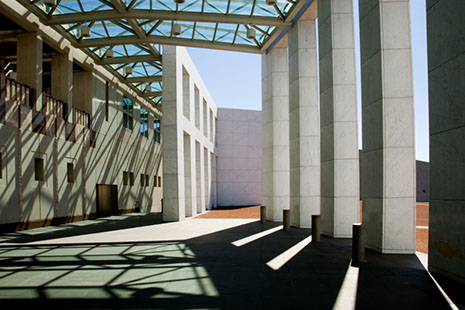THE RUDD GOVERNMENT’s decision to defer its emissions trading scheme is probably good pragmatic politics on the part of the prime minister, a pragmatist above all. It is also, in the domestic political context, a smart tactical move, forcing Malcolm Turnbull into all sorts of contortions to find a way not to support it in the Senate.
It is probably a misreading to see in the move a ploy to bring on a double dissolution, as that would work to the significant advantage of the Greens, who would almost certainly hold the balance of power in a new Senate. Of course, such a realisation may yet persuade the Liberals to support the government, if only to avoid any future government being held hostage by the Greens. The ball really is now in the opposition’s court.
Kevin Rudd sniffs the political wind as well as anyone, and he would not have missed the volte face of the powerful Business Council of Australia on the carbon trading issue, so he knew he could at least count on some kudos from that quarter. To the charge that the government has reneged on a key election promise, it is hard to argue with climate change minister Penny Wong, who reminds us that Labor also promised to manage the economy, and what might have worked in 2007 won’t work now given the radically changed circumstances of the financial crisis.
There is much speculation as to who are the winners and losers in Labor’s tactical retreat: Rudd is claiming the mantle of sober responsibility and Turnbull is saying he merely bowed to the inevitable and accepted what the Liberals had been saying all along. Business is also crowing. With carbon trading delayed by twelve months to July 2011 and the prospect of big-polluting exporters receiving more compensation to help them adjust, it is clear that the government has buckled to some powerful lobbying and some employment pressure that might be construed as blackmail.
The real losers, however, are the environment and the people. A less obvious, but equally important, loser in all of this is our increasingly enfeebled democracy – once again trashed by the corporate juggernaut. This just one more example of what the American political scientist, Carl Boggs, has called the corporate colonisation of society. A deal has been struck between self-interested business elites and a supposedly representative government that has effectively capitulated: the public – and the public interest – have simply been excluded from the equation.
The current hiatus, made under the convenient guise of the global recession, is merely a continuation of resistance by business to the very problem it has caused and singularly failed to address. By the late 1990s, verifiable and reputable scientific research had demonstrated the clear and present danger of global warming. The response from business was first to seek to obfuscate with a manufactured scepticism, disputing even the existence of the problem, and then to hijack governments and seek to discredit, marginalise and silence public interest advocates for urgent and drastic action.
It is part, in a far broader sense, of capitalism’s greatest triumph, which is not the generation of abundance so much as its effective depoliticisation – and with that its removal from any form of public accountability or influence. The addiction to a system predicated on an economics of constant growth and expansion is not even being addressed in what passes for public debate of the issue, and governments cravenly acquiesce. Given the level of concern about global warming measured in any number of opinion polls, the public’s already faltering confidence in representative democracy is certain to take another hiding.
Of course, as the Rudd government has said, there is no point in taking a stand without broad and binding international agreement. But with governments everywhere in thrall to business interests, however discredited, there is little prospect of agreement being reached, and that’s exactly as global capitalism wants it.
Business, not government, was blamed for the Great Depression. The foundation of the pro-business think tank, the Institute of Public Affairs – incidentally one of the most vociferous opponents of action on climate change – came about as a means of business seeking to burnish its post-Depression image and “educate” the public about the “virtues” of private enterprise. But Australians remain sceptical.
The respected Australian Election Study has measured attitudes for years. When respondents are asked their reaction to the statement that big business has too much power, 22.1 per cent strongly agreed in 1990, 27.7 per cent in 1993, 29 per cent in 1996, 31.1 per cent in 1998, 31.8 per cent in 2001 and 27.1 per cent in 2004. By contrast, only 15.5 per cent thought the same of trade unions in 2004.
Another case – and certainly in the Australian context – of deals being done between government and business over the heads of the people is that of the prickly issue of privatisation. On no occasion has a government, state or federal, dared ask the people for a vote on the issue: they know only too well that a majority of the Australian people look favourably on public ownership. It was not all that long ago that John Howard’s scheme to sell of the Snowy hydroelectric scheme – jointly owned by the Commonwealth, New South Wales and Victoria – was abandoned after a loud public outcry. It is doubtful if the public would ever have agreed to the sell-off of the Commonwealth Bank, Telstra and Qantas if it has been asked. For the NSW government this remains a live and contentious issue, with opinion polls showing that close to 80 per cent of the people want the power industry to stay in public ownership.
In 1949, Liberal leader Bob Menzies advocated a constitutional amendment for future governments to seek approval via referendum if they wanted to nationalise an industry. (He never followed up on it after winning government, which suggests it was merely part of his socialist scare campaign.) But there certainly is a case for such an amendment to cover the sell-off of publicly owned assets. Do we hear any such voice advocating on behalf of the public?
The implications for democracy are worrying. It is not just that governments – ostensibly elected by and accountable to the people – are powerless in the face of business self-interest intransigence, but that the real public interest is without a voice.
We must start to ask the question: whose society is it? Theirs or ours? It was Aristotle who first promoted the idea that that people were designed by nature to live and be active in the polis. The polis, as society, existed only for the sake of “the good life.”
Where is it now? •




